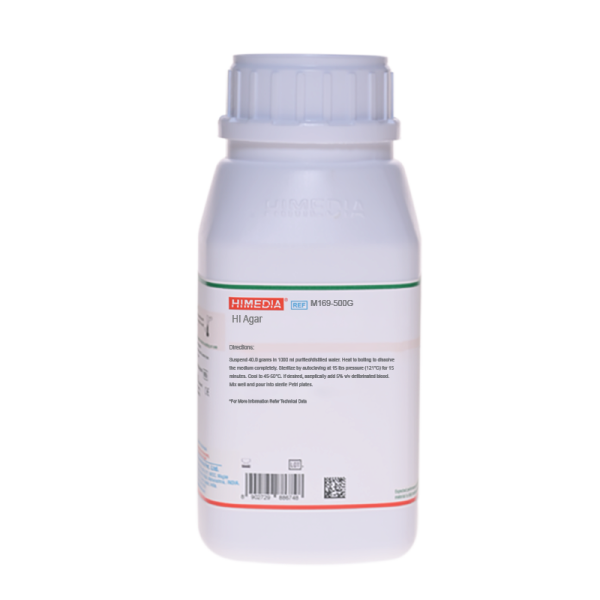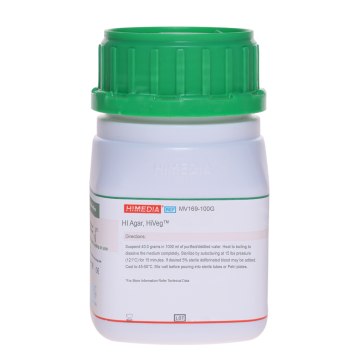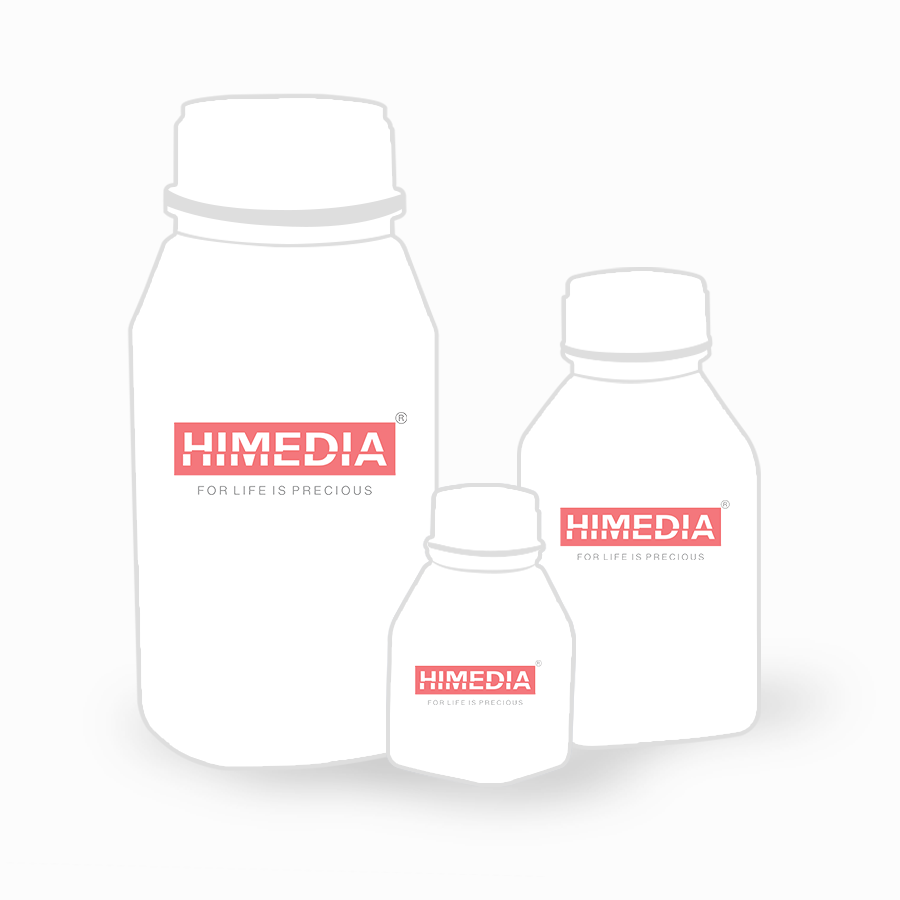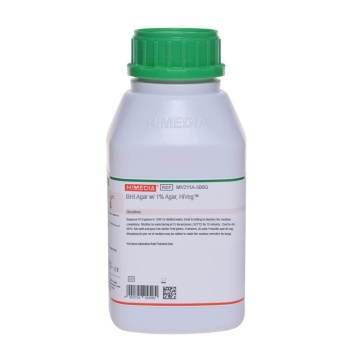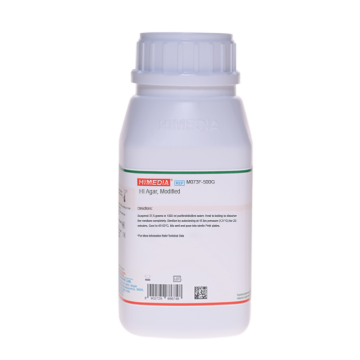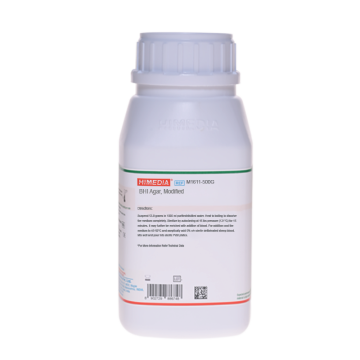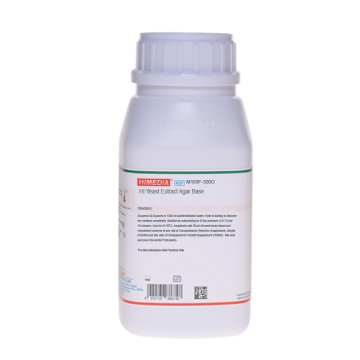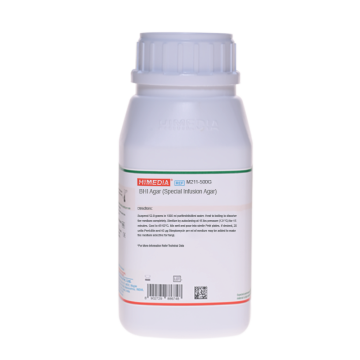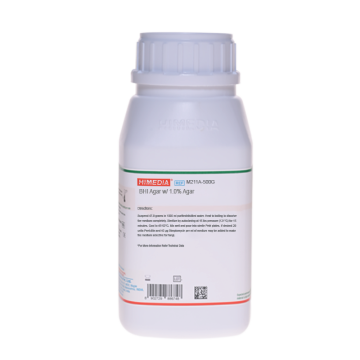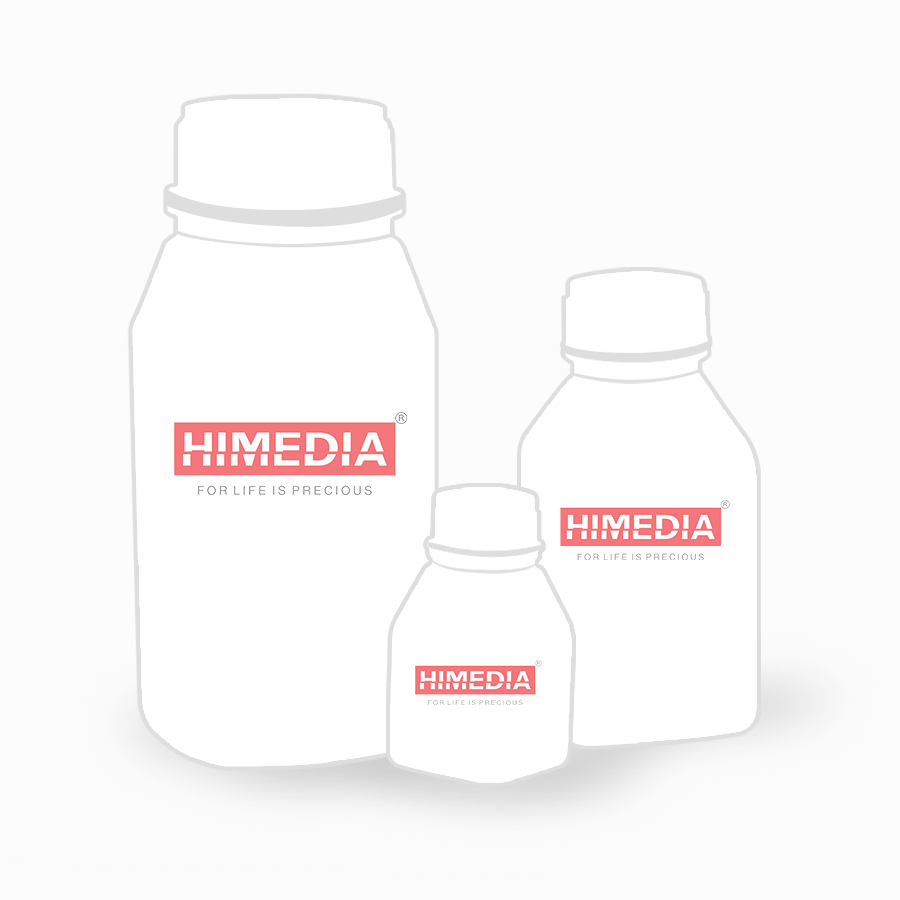 Your enquiry has been submitted
Your enquiry has been submitted
HI Agar (Heart Infusion Agar)
Bordetella#CC293D
Intended Use
Recommended for isolation and cultivation of a wide variety of fastidious organisms. It is also used as a base for preparation of blood agar in determining hemolytic reactions.
Composition**
| Ingredients | g / L |
|---|---|
| HM infusion B from 500 g # | 10.000 |
| Tryptose | 10.000 |
| Sodium chloride | 5.000 |
| Agar | 15.000 |
Final pH ( at 25°C) 7.4±0.2
**Formula adjusted, standardized to suit performance parameters
# Equivalent to Beef heart, infusion from
Directions
Suspend 40.0 grams in 1000 ml of purified / distilled water. Heat to boiling to dissolve the medium completely. Sterilize by autoclaving at 15 lbs pressure (121°C) for 15 minutes. Cool to 45-50°C. If desired 5% v/v sterile defibrinated blood may be added. Mix well and pour into sterile Petri plates.
Principle And Interpretation
Fastidious organisms having exacting nutritional requirement could be cultivated on infusion media, as demonstrated by Huntoon (1). A liquid medium containing an infusion of meat was one of the first media used for the cultivation of bacteria. These infusion media need not be further supplemented by the addition of supplements for cultivation of fastidious bacteria (2). HI Agar, containing HM infusion B from (equivalent to infusion from beef heart) is used for the isolation and cultivation of a wide variety of fastidious organisms (3). HI Agar can also be used for the cultivation of Vibrio species (2,4). It can also be supplemented with glucose, horse serum and antibiotics for the cultivation a wide variety of organisms (3). It is used for mass cultivation of organisms for preparation of vaccines. On supplementation of blood, HI Agar can be used to study haemolytic reactions (5). This medium was used for isolation and enumeration of haemolytic Streptococci in milk (6). Tryptose and HM infusion B infusion provide nutritional requirements for the pathogenic bacteria. Sodium chloride maintains the osmotic equilibrium of the medium.
Type of specimen
Clinical samples - Pus, urine, faeces samples, skin lesions; Food and dairy samples - Milk, meat samples
Specimen Collection and Handling
For clinical samples follow appropriate techniques for handling specimens as per established guidelines (7,8).
For food & dairy samples, follow appropriate techniques for sample collection and processing as per guidelines (9,4).
After use, contaminated materials must be sterilized by autoclaving before discarding.
Warning and Precautions
In Vitro diagnostic Use. For professional use only. Read the label before opening the container. Wear protective gloves/protective clothing/eye protection/ face protection. Follow good microbiological lab practices while handling specimens and culture. Standard precautions as per established guidelines should be followed while handling clinical specimens. Safety guidelines may be referred in individual safety data sheets.
Limitations
- Further biochemical and serological tests must be carried out for complete identification.
- Individual organisms differ in their growth requirement and may show variable growth patterns on the medium.
- Each lot of the medium has been tested for the organisms specified on the COA. It is recommended to users to validate the medium for any specific microorganism other than mentioned in the COA based on the user’s unique requirement.
Performance and Evaluation
Performance of the medium is expected when used as per the direction on the label within the expiry period when stored at recommended temperature.
Quality Control
Appearance Cream to yellow homogeneous free flowing powder
Gelling Firm, comparable with 1.5% Agar gel
Colour and Clarity of prepared medium Basal medium : Light yellow coloured, clear to slightly opalescent gel After addition of 5-7%w/v sterile defibrinated blood : Cherry red coloured, opaque gel forms in Petri plates
Reaction Reaction of 4.0% w/v aqueous solution at 25°C. pH : 7.4±0.2
pH 7.20-7.60
Cultural Response Cultural characteristics observed with added 5-7% w/v sterile defibrinated blood, after an incubation at 35-37°C for 18-48 hours.
| Organism | Inoculum (CFU) | Growth w/o blood | Recovery w/o blood | Growth with blood | Recovery with blood | Haemolysis |
|---|---|---|---|---|---|---|
| Staphylococcus aureus subsp. aureus ATCC 25923 (00034*) | 50-100 | good-luxuriant | >=70% | luxuriant | >=70% | beta |
| Neisseria meningitidis ATCC 13090 | 50-100 | luxuriant | >=70% | luxuriant | >=70% | none |
| Streptococcus pneumoniae ATCC 6303 | 50-100 | good | 50-70% | luxuriant | >=70% | alpha |
| Streptococcus pyogenes ATCC 19615 | 50-100 | good | 50-70% | luxuriant | >=70% | beta |
| Escherichia coli ATCC 25922 (00013*) | 50-100 | luxuriant | >=70% | luxuriant | >=70% | beta |
Key : (*) Corresponding WDCM numbers.
Storage and Shelf Life
Store between 10-30°C in a tightly closed container and the prepared medium at 2-8°C. Use before expiry date on the label. On opening, product should be properly stored dry, after tightly capping the bottle in order to prevent lump formation due to the hygroscopic nature of the product. Improper storage of the product may lead to lump formation. Store in dry ventilated area protected from extremes of temperature and sources of ignition. Seal the container tightly after use. Product performance is best if used within stated expiry period.
Disposal
User must ensure safe disposal by autoclaving and/or incineration of used or unusable preparations of this product. Follow established laboratory procedures in disposing of infectious materials and material that comes into contact with clinical sample must be decontaminated and disposed of in accordance with current laboratory techniques (7,8).
Reference
- Huntoon F. M., 1918, J. Inf. Dis., 23:169.
- FDA Bacteriological Analytical Manual, 8th Ed., AOAC International, Gaithersburg, MD.
- Atlas R. M., 2004, Handbook of Microbiological Media, 3rd Ed., CRC Press.
- American Public Health Association, Standard Methods for the Examination of Dairy Products, 1978, 14th Ed., Washington D.C.
- Murray P. R., Baron J. H., Pfaller M. A., Jorgensen J. H. and Yolken R. H., (Eds.), 2003, Manual of Clinical Microbiology, 8th Ed., American Society for Microbiology, Washington, D.C.
- Diagnostic Procedures and Reagents, 1950, 3rd Edition, 13.
- Isenberg, H.D. Clinical Microbiology Procedures Handbook 2nd Edition.
- Jorgensen, J.H., Pfaller, M.A., Carroll, K.C., Funke, G., Landry, M.L., Richter, S.S and Warnock., D.W. (2015)Manual of Clinical Microbiology, 11th Edition. Vol. 1.
- Salfinger Y., and Tortorello M.L., 2015, Compendium of Methods for the Microbiological Examination of Foods, 5th Ed., American Public Health Association, Washington, D.C.
| Product Name | HI Agar (Heart Infusion Agar) |
|---|---|
| SKU | M169 |
| Product Type | Regular |
| Physical Form | Powder |
| Origin | Animal |
| Packaging type | HDPE |
| References | 1. American Public Health Association, Standard Methods for the Examination of Dairy Products, 1978, 14th Ed.,Washington D.C. 2.Atlas R. M., 2004, Handbook of Microbiological Media, 3rd Ed., CRC Press. 3.Diagnostic Procedures and Reagents, 1950, 3rd Edition, 13. 4.FDA Bacteriological Analytical Manual, 8th Ed., AOAC International, Gaithersburg, MD. 5.Huntoon F. M., 1918, J. Inf. Dis., 23:169. 6.Isenberg, H.D. Clinical Microbiology Procedures Handbook 2nd Edition. 7.Jorgensen, J.H., Pfaller, M.A., Carroll, K.C., Funke, G., Landry, M.L., Richter, S.S and Warnock., D.W. (2015) Manual of Clinical Microbiology, 11th Edition. Vol. 1 |
| Customized Product Available | No |



